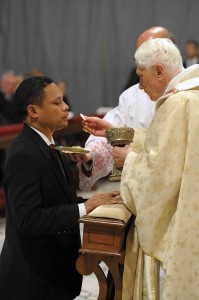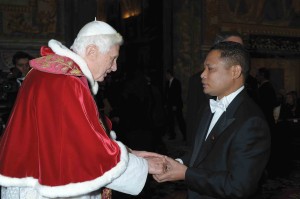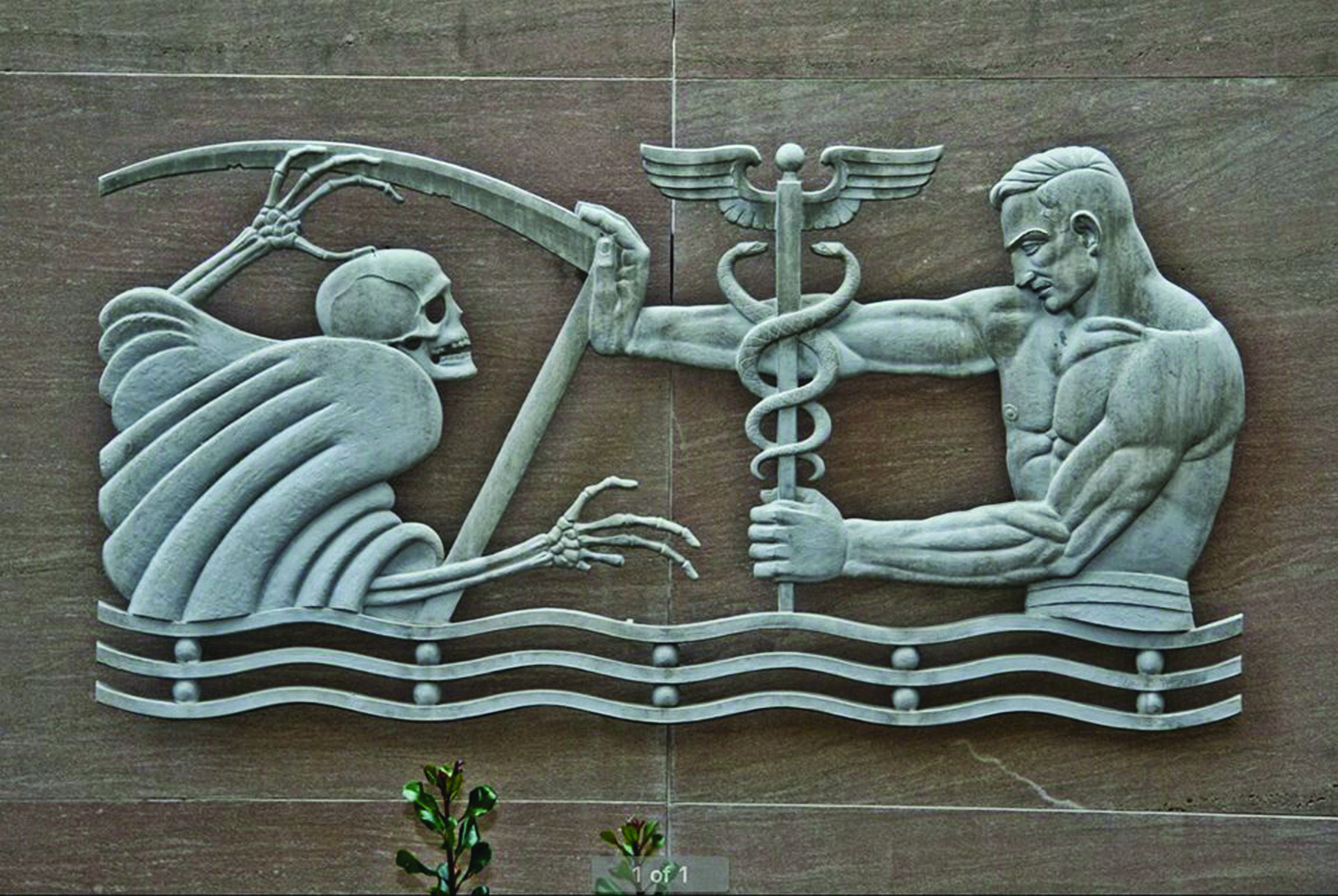Interview with Armindo Pedro Simoes, currently chargé d’affaires of the embassy of the Democratic Republic of East Timor to the Holy See.
“We, Timorese people, are very proud to be known as one of the most Catholic nations, not only in Asia, but in the world.”
—Armindo Pedro Simoes, chargé d’affaires of the embassy of the Democratic Republic of East Timor
The tiny country of East Timor is one of the two predominantly Catholic countries, along with the Philippines, in East Asia. East Timor was colonized by Portugal in the 1500s. In 1975, the country declared its independence, but later that year was invaded and occupied by Indonesia. In 1999, following the United Nations-sponsored act of self-determination, Indonesia withdrew and East Timor became the first new sovereign state of the 21st century on May 20, 2002.
How can a nation with such a troubled recent history rise and find its way out of destruction, violence, colonization and all its consequences? To find out, we talked to a young, dynamic Timorese diplomat, who, apart from giving an insight into his country’s present efforts, also highlighted the vital role of the Church in this process. He says the Church acts as an instrument to motivate people to renew their faith.
In the Year of Faith which just started, the local Church in East Timor seems to be fully “in line” with Benedict XVI’s ideas about how to put into practice the new evangelization.
Armindo Pedro Simoes is currently the chargé d’affaires of the embassy of the Democratic Republic of East Timor to the Holy See. During his country’s struggle for independence against Indonesia, he was an activist and a dynamic young leader of the East Timor Student Solidarity Council, an organization which actively participated in fighting against the invasion of Indonesian forces into East Timor. He has been working as a diplomat since 2004.
The Holy See and East Timor established diplomatic relations in 2002 after the country regained independence from Indonesia. At present it is the chargé d’affaires who represents the republic to the Vatican. Why?
Armindo Pedro Simoes: Since the termination of the mission of the previous ambassador in 2010, our government became very meticulous in looking for the right, best-qualified person to replace him, because the Vatican for us is a special state and the center of Catholicism in the world, a state we have to build a strong relationship with. There were some impediments which made the process slower. For example, the recent presidential and parliamentary elections both took place this year. But I want to say that our new president, H.E. Taur Matan Ruak, took his oath of office in May and the new government was officially inaugurated in July. The government gives special priority to looking for a new ambassador, and one will most probably arrive early next year.
How is working with the Vatican diplomacy compared to other countries?
Armindo Pedro Simoes: I have been in this position for almost two years now. Working with the Vatican diplomacy is really quite different and special because we only focus on religious diplomacy, unlike with other countries, where you have to deal with bilateral issues, political and military cooperation, trade and investment, among others. Being a country with 98% Catholic population, it is a really great honor to be working with the Holy See and strengthening ties with the Vatican in spiritual diplomacy.

Armindo Pedro Simoes receives Communion from Pope Benedict
What do you like most in your work with the Holy See?
Armindo Pedro Simoes: It is a rare opportunity to be working together with the Holy See and with all the Catholic countries and international organizations aiming for a common goal, which is a better and more peaceful world. What made me love and appreciate working with the Holy See is the idea of working hard hand-in-hand in raising human values and human dignity, promoting education, upholding justice, and being involved in interreligious dialogue to create peace, working together as one, aiming for a common noble goal for the renewal and strengthening of the Catholic faith, and reaching out to everyone. This is what made the biggest impression on me.
What are the key issues in the relations between your country and the Holy See? What are areas of common interest?
Armindo Pedro Simoes: As of now, we do not have any bilateral agreement with the Holy See that we have signed. But we are hoping that we will have this done soon. The areas of common interest are: raising common initiatives, interreligious dialogue among people, upholding human dignity and moral values, talking in depth on climate change, and promoting education, especially to the young generation.
During the long years of occupation imposed on the country by Indonesia in 1975, did the Church play a role?
Armindo Pedro Simoes: From 1975 until 2002, when we regained our independence from Indonesian colonization, the role of the Church was very significant. It was the only institution in which the people believed and trusted because the Church stood for the people, especially in speaking out on the violations of human rights, injustices, and Indonesian military abuses, which made the people feel that the Church was, as always, on their side. The Church acted as the voice of the voiceless. Even more, they did works of charity to benefit all the victims during the Indonesian colonization.
The strong Catholic identity of the Timorese was a sign of resistance to the occupation. Has this close tie to the Catholic identity changed since the independence?
Armindo Pedro Simoes: As far as the still overwhelming percentage of Catholics in East Timor, I would say that the close ties to the Catholic identity never changed but were even strengthened, and our Catholic faith is continuously renewed and deepened. We as Timorese are so proud to be known as one of the most Catholic nations, not only in Asia, but in the world.

Armindo Pedro Simoes meets Benedict XVI.
How has the country been living the years of transition after 2002? What are the major problems and obstacles and the big achievements?
Armindo Pedro Simoes: My country within the 10 years of transition after the restoration of independence in 2002, I may say, had a lot of struggles and challenges. It wasn’t and still is not an easy journey because, of course, having been recently recognized as an independent state after long years of battles and struggles, we were faced with lots of problems left over from the previous experiences. At the beginning, we had to face a largely (80%) destroyed infrastructure because of all the past wars and battles. Also, the unemployment rate was, and still is, high. Being a newly-recognized independent state, we also lack foreign investment and economic opportunities, which also causes the high unemployment rate in the country. Lack of proper experience and knowledge also became an obstacle for stability and progress since most of the population lack education and political awareness. Having little foreign investment means also fewer funds, hindering rapid development in transportation, health and social services.
But amid all these problems and obstacles, our government is doing its best to solve all these hindrances one step a time, and promote our country to gain more business opportunities.
I am proud to say that my country, despite all these problems, has maintained the security situation stable. Our people live peacefully. Peace and order is greatly controlled. Another major achievement of my country is the establishment of a good relationship with Indonesia, which colonized us for so long. Instead of bitterness, we have a mutual bilateral agreement with their government, and now they are even supporting us in all our endeavors. We have moved on and look forward toward a better future. Another major accomplishment of East Timor is the growing representation and promotion of our country in different states in the world, including the Vatican. As of now, we have more than 30 embassies and consulates around the world.
Pope Benedict XVI, in his speech to the new ambassador in 2007, urged the promotion of a culture of solidarity and peaceful coexistence in justice. What has happened in this regard?
Armindo Pedro Simoes: The government of East Timor has always been supportive of the goal. Internally, our state upholds the culture of solidarity and gives importance to equality. Everyone in the country has equal rights and privileges, and we respect all people of any race and of any kind. Being evident in this call for solidarity and peace, East Timor has maintained good relations among all countries, especially our neighboring countries such as Australia, Indonesia, Malaysia, the Philippines and Thailand, among others. Being a member of the United Nations, we take part in the different movements and activities of the organization to promote unity and justice. We have growing international affiliations such as the community of Portuguese-speaking countries, and we are the current chair of the G7+, an international group of fragile countries. We are also working on becoming a member of the ASEAN community.
How does the Church help the population to overcome the painful experience and memories of the massacres of the recent past, and the struggle for independence?
Armindo Pedro Simoes: The Church has always been very supportive with the people during all the struggles in our country. The Church acts as an instrument to motivate people to renew their faith and lives and to forget the past. The Church encourages people to be more positive with life and not to lose hope and to move on with the future. The Church has been acting as the voice of the voiceless people and makes people feel that the Church will always be on their side amidst all these struggles of life.






Facebook Comments